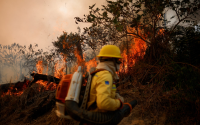LatelineAustralian Broadcasting CorporationTV PROGRAM TRANSCRIPTBroadcast: 07/03/2005Reporter: Tony Jones | |
TONY JONES: Now to our guest. Author and journalist Ross Gelbspan has taken on the global-warming sceptics in a series of books and articles. His latest book is called The Heat Is On: The Climate Crisis, The Cover-Up and The Prescription. I spoke to him just a short time ago in Boston.TONY JONES: Ross Gelbspan, thank you for joining us. ROSS GELBSPAN: My pleasure, Tony. Thank you for having me on. TONY JONES: Now, no matter how many scientists or governments sign up to the idea that the planet is getting dangerously hotter, you still find there's a hard core of committed sceptics, many of them reputable scientists like Professor Richard Lindzen from MIT. Can I ask you first: what if they're right?ROSS GELBSPAN: If they're right and catastrophic future, then we still, I think, would be doing the right thing by changing away from coal and oil to clean energy. That would clear the air, it would do away with a lot of lung diseases, it would create lots and lots of jobs, especially in developing countries, so I really see it as a no-lose situation. If they're right, we are still going to run out of oil in another 40, 50 years, the world will be, and we'll still need to make this transition, albeit without the same amount of urgency. TONY JONES: The sceptics try to make the point that global warming is nothing but a theory. I mean, can you counter that? Is it more than a theory now, at this point? ROSS GELBSPAN: Well, first of all, step back for one second, and what we know about the climate comes from more than 2,000 scientists from 100 countries, reporting to the UN in what is the largest and most rigorously peer-reviewed scientific collaboration in history. This is about as close to truth as we can get. If you want to go beyond the science and look at the very visible impacts, we can see that we are heating the deep oceans, we have reversed the carbon cycle by 400,000 years, we're seeing a big increase of violent weather all over the world, we've altered the timing of the seasons. All over the world, fish, insects birds, plants and animals are migrating toward the poles in search of temperature stability. So if you put together all the evidence, the scientific evidence, the field evidence, it really seems like a very open-and-shut case. TONY JONES: Why, then, are the sceptics so passionate about the arguments they're putting forward, and they are putting them forward with incredible passion. Richard Lindzen, who we just mentioned, for example, compares global warming to eugenics as an abuse of science. ROSS GELBSPAN: Well, Mr Lindzen does, but Mr Lindzen is really sort of out there on a limb. I don't know very many supporters of Mr Lindzen who are not in the pay of the fossil fuel lobby. Dr Lindzen himself, his research is publicly funded, but Dr Lindzen makes, as he told me, $2,500 a day consulting with fossil fuel interests, and that includes his consulting with OPEC, his consulting with the Australian coal industry, his consulting with the US coal industry and so forth. That's not to say Dr Lindzen doesn't believe what he says, but it is to say that he stands in very sharp distinction to really just about virtually all of the climate scientists around the world. TONY JONES: Is it also becoming a little hip to be sceptical? I mean, we've now seen Lindzen's influence creeping into popular culture. We have, for example, Michael Crichton's new novel, State of Fear, in which the hero is a global warming sceptic who roams the world for a secret US agency defeating evil environmentalists. I mean, this is so turning on its head the kind of popular mythology that we've seen in the past that you wonder where it's coming from. ROSS GELBSPAN: You do. I think Dr Lindzen, with whom I've met, has just a streak of contrarianism in his personality, and it could be that Michael Crichton does, too. I don't know Michael Crichton. I do know that the science that's advanced in Michael Crichton's book is really bogus and it simply does not hold up to examination at all. There's a very good web site that a number of climate scientists put together called realclimate.org to show where all the flaws in Crichton's thinking are. TONY JONES: One of the things the sceptics have in common is an incredible passion, it seems to me, and they seem to match the passion of some environmentalists. Recently we had on our program President Putin's reputed economic adviser, Andre Illarionov, who claims that global warming science is nothing but propaganda and the scientists who put it forward are a dangerous totalitarian sect. Now, how influential are people like Illarionov? ROSS GELBSPAN: I gather he's not that influential, even in Russia, because President Putin did sign on to the Kyoto protocol. I know he is a darling of the right-wing institutes like the Kato Institute and others in the United States that are fighting against action on global warming. But in the big picture, I really don't see them having very much influence on what's going on, especially with the world having signed Kyoto and moved forward. Again, to put this in context, if I can, while the US is dragging its heels because the Bush administration is certainly lined up with coal and oil interests, look at what's happening in Europe. Holland has just finished a plan to cut her emissions by 80 per cent in 40 years; Tony Blair has committed the UK to cuts of 60 per cent in 50 years; the Germans have committed to cuts of 50 per cent in 50 years; and about two weeks ago, President Chirac of France called on the industrial world to cut their emissions by 75 per cent in 45 years, and clearly, these leaders would not be taking these wrenching policy pronouncements if they did not - if they had any real confusion about the science. TONY JONES: Whose advice, then, is the Bush White House taking on major scientific issues like this, and in particular on global warming? What is the US Academy of Sciences saying, for example, and do they have any influence in the White House? ROSS GELBSPAN: The National Academy of Sciences, it's very interesting. Several years ago, President Bush said he did not want to accept the findings of this intergovernmental panel because it represented foreign science, so he wanted the United States' own scientific body to weigh in. The National Academy of Sciences then came out with a report saying not only is the IPCC right, they're actually underestimating some of the impacts that we'll be feeling down the road. So clearly, the President did not take that advice. The President's policies on climate and energy are essentially being dictated by Exxon-Mobil, Peabody Coal and some of the other large coal and oil interests. For example, the previous head of the intergovernmental panel on climate change was Dr Robert Watson. He was an Australian-born scientist. Watson was very, very highly regarded, both for his own scientific expertise and the way he ran this whole IPCC, and when President Bush was elected, Exxon-Mobil sent him a memo saying, "Please get rid of Watson. We don't want Watson in there." In fact, President Bush decided not to support Watson's re-election and he got bumped out of that job. So that's a quick example of the kind of influence that we're seeing of the oil and coal industries in the Bush administration. TONY JONES: What do you make of the argument that's going on within the environmental movement that the situation is so pressing, we are so close to a tipping point, that the only way of actually saving the planet is to move quickly to nuclear energy on a large scale? ROSS GELBSPAN: Nuclear waste, as you know, needs to be protected for at least 10,000 years, and that is a promise we cannot in good conscience make to future generations. There is no known way of really storing nuclear waste. And in fact, there is not very many people in the environmental community who are promoting this. But I think it's important, Tony, to go back to one thing you said. This sense of urgency is not coming first from the environmental community; it is coming from the scientific community, and Dr Rajendra Pachauri, an energy expert who is head of the intergovernmental panel said recently we have a 10-year window in which to make severe cuts in our carbon uses if "humanity is to survive". That science is based on a very simple fact. It's based on the measurements of carbon dioxide in the atmosphere. For 10,000 years we had the same amount, 280 parts per million, until the world began to industrialise about 150 years ago. That 280 is now up to 380. That is a level this planet has not experienced for 420,000 years. In another 10 to 20 years, at current rates of emissions, we will surpass the 400 part per million mark, and that for many scientists is a real point of no return, because that will raise the planet's temperature by two degrees celsius from pre-industrial levels and that is the temperature at which all kinds of planetary systems really begin to change and sort of spiral out of control until they snap into a new equilibrium. So we are a very small distance away from really seeing things, sort of, get out of control in ways we can't even predict. TONY JONES: Just to once again look at the sceptics' argument, just to get your impression of it, Illarionov's central argument is that the present period of global warming - he admits there is a period global warming - is nothing more, he claim, than a normal fluctuation as we've seen throughout the world's history, and this is a view put by sceptical geographers, if you like. ROSS GELBSPAN: That's true, and that is indeed a central question. And in 1998 - I'm sorry, in 1988, the United Nations set up this panel of scientists to address precisely that question. The UN said, "Look, the temperature's going up, we don't know if this is due to natural variations or whether this is due to human activities." The scientists worked very hard, they performed a number of experiments by which they distinguished greenhouse warming from our burning of fossil fuels from natural warming, and they concluded in 1995 that this was due to human activity and those findings have only become more strengthened and I won't bore you with a lot of the science but I'd love to give you one quick experiment that's very, very telling and that's this: that climate scientists have discovered that as earth's temperature is rising, the night-time low temperatures are rising twice as fast as the day-time high temperature. That's because the carbon dioxide and the other greenhouses gases are trapping the heat in overnight. That is an indisputable fact. If it were natural warming, the highs and lows would rise and fall in parallel. I think there's a rather tragic consequence of that finding, and we saw that in the summer before last, where we had 35,000 heat deaths in Europe, and I think the reason for those fatalities lies in the fact that when a person's body becomes heat stressed during the day-time and they don't get the normal night-time cooling to allow them to recuperate, it takes this terrible toll on people's bodies. So that night-time low finding is one of about 8 or 9 what are so-called signature experiments that have distinguished greenhouse warming from natural variability. TONY JONES: Let me can you one final question and it is a critical one, because once again, it's something the sceptics claim doesn't really exist. And that is: scientific consensus on this issue of global warming. How do you measure scientific consensus? ROSS GELBSPAN: Well, I think the issue of peer review is critical. And if you look at all the peer-reviewed work of people who are researching various aspects of the climate, there is virtually no research that has been peer reviewed that says this is not happening. And so there is a very strong consensus, and as I say, this IPCC looks at the work of more than 2,000 scientists from 100 countries, and they conclude that there is really no challenge to the larger trends. There are disputes about a lot of second-level questions. There are disputes about the rates of future warming, about specific impacts in geographical regions, about the role of clouds, for example, some clouds reflect heat, some clouds trap in heat, but in terms of the larger trends, there is a consensus, there is no dispute among any real credentialed scientists about what is happening and even Dr Lindzen acknowledges it's happening. He just sort of dismisses it as being negligible. TONY JONES: Well, Ross Gelbspan, we do thank you very much for coming in on a very cold Boston morning and taking the time to join us on Lateline. Thank you very much. | |
Journalist puts global warming sceptics under the spotlight
08 Mart 2005
-
Aa
+
a
a
a






